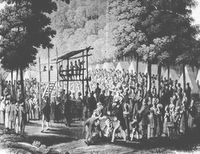
Hoo-ha! I'm excited. Before I tell you why, I want to briefly direct your attention to a wonderful quote from a
book which both
Fr. Rick and
Sivin Kit are reading and blogging about - which inevitably means that I'm going to have to bump it up in my "to read" queue. The quote also serves as a brief introduction to the sort of thinking that I'm so excited about. Here it is, from Sivin's blog (HT:
Brother Maynard):
God is about a big purpose in and for the whole of creation. The church has been called into life to be both the means of this mission and a foretaste of where God is inviting all creation to go. Just as its Lord is a mission-shaped God, so the community of God's people exists, not for themselves but for the sake of the work. Mission is therefore not a program or project some people in the church do from time to time (as in "mission trip", "mission budget" and so on); the church's very nature is to be God's missionary people. We use the word missional to mark this big difference. Mission is not about a project or a budget, or a one-off event somewhere; it's not even about sending missionaries. A missional church is a community of God's people who live into the imagination that they are, by their very nature, God's missionary people living as a demonstration of what God plans to do in and for all of creation in Jesus Christ. ~ Alan J. Roxburgh & Fred Romanuk, The Missional Leader, p.XV
So, it's easy to think that much of the Episcopal Church, generally, is a long way from this missional ideal. And sometimes I do think that. Any maybe much of it is. But then Rick+ pointed me at a document from the recent General Convention of the Episcopal Church. It's the Convention report of the
Standing Commission on Domestic Mission and Evangelism. If you're interested in signs of missional life in either TEC in specific or in "liberal mainline" denominations in general, you might want to read the
whole thing, but here are some quotes:
Mission means translating the gospel into the people’s vernacular. Whether it be English in the 16th century, Dinka and Xhosa in the 19th century, or contemporary music in the 21st century, the Christ who is the Word made flesh must be made known again and again in the language of the people. Younger generations speak the language of contemporary music, culture, art, and film. The Church must translate the eternal gospel message into that language.
The Commission recognizes two different traditions of mission that exist in our church. One emphasizes evangelism and the other one emphasizes social justice. The SCDME states unequivocally there is no conflict between these imperatives. Those who would be faithful to Scripture and to the life and witness of Jesus Christ must obey both.
The present time of controversy is not the time for schism, but an opportunity to embody the oneness of the Body of Christ. This is the very moment to show we are one by our love.
We make disciples by loving one another. This is how we can follow the two imperatives: the Great Commandment—love God and our neighbor … and the Great Commission—make disciples.
Also:
Mission means Reconciliation: Reaching out to the Other Jesus teaches us to be reconciled with our brothers and sisters before offering our gifts to God (Matthew 5:23-24). Both reconciliation with the Other and reconciliation with God are gifts of grace that we are called to live out concretely in our daily lives.
God’s mission of reconciliation means our Church is not just about us. God’s mission of reconciliation calls us to leave behind comfortable communities where people look, sound, act and dress like us, to turn away from our circle of friends at coffee hour and to seek the outsider. In our rapidly shrinking and wonderfully multicultural world, the Church is called to be the presence and agent of God’s reconciling love in the world—urgent, dynamic and sacrificing.
And:
We call on every bishop, priest, deacon and layperson in the Episcopal Church to take personal responsibility, embrace this vision, and do the work of ministry. Together, we must form and re-form our congregations and local faith communities to be agents of God’s reconciling work in a world that is changing before our very eyes. We must turn ourselves inside-out.
Then they take the Bishops to task for not driving missional reform. Yee-hah!
The Resolutions (included in
the document) are great and very much worth reading. You might particularly want to check out A037, "Evangelism".
This document is not without (what I would perceive as) flaws. There's an implication that all of this is in service to the "20/20 Vision" goal of doubling the average Sunday attendance (ASA) of TEC by the year 2020. This (as I've stated previously) bugs the bejeebers out of me. The point is
not that we must grow as an institutional church, and therefore I guess we'd better think missionally 'cause that's the only way we can grow and not shrink down to nothing. Hogwash! The point is that, as followers of Jesus, we must participate in the
missio Dei! If that leads to the numeric growth of our institution, then yippee! But that's a
secondary goal, at best.
The funny thing is that I think the folks on the Standing Commission grok this, but I suspect they're holding "church growth" out there like a carrot that the rank-and-file (including the rank-and-file in the House of Bishops) might "get", while they
won't necessarily "get" the missional imperative to transform our communities in service to God's mission. If I'm right, I don't think I agree with that strategy. I think we've got to do the hard work of inviting transformation on every level of the church, not settling for "Come on, can't you please just
act missional - for the sake of your pension??"
Sorry, that may have been a bit too cynical. The other thing that bugged me (to a much lesser extent) was the apparent assumption, in the discussion of church planting, that church planting means church building. Who said a church needs a building? It's not just
nondenominational emerging churches that do without them - perfectly good Episcopal Churches (like
this one and
this one) do too.
But don't let me give you the impression that I'm down on the
Standing Commission on Domestic Mission and Evangelism - like I said at the beginning, I'm really excited to see this kind of stuff coming out of General Convention. My biggest problem with it is that nobody knows about it. This - and our embrace of the Millennium Development Goals - should be the biggest story coming out of GenCon. Every diocese and parish should be getting excited about this stuff. I know that's too much to hope for, but at least I know that Fr. Rick intends to give this a high profile at Church of the Holy Comforter.
Yeah! You go, SCDME! :-D
 I really should have noted this at the beginning of the month, but oh well - it's still July. This month marks my one-year anniversary of "serious" blogging. As you can tell from the "Archives" links to the left, this blog goes back to May of 2003, but before July 2005 I was very sporadic and lazy about it. In fact, I didn't post at all the previous month, June of 2005. That was typical. But one year ago this month, I decided to make blogging an intentional practice, and try to blog at least once a week. Since then, it's become a springboard for online community like I never would have dreamed. Blogging, and reading and commenting on others' blogs, connects me with close "real world" friends I see weekly as well as with with folks I've never met in person who live as far away as Canada, South Africa, and Malaysia. It's cool, boys and girls!
I really should have noted this at the beginning of the month, but oh well - it's still July. This month marks my one-year anniversary of "serious" blogging. As you can tell from the "Archives" links to the left, this blog goes back to May of 2003, but before July 2005 I was very sporadic and lazy about it. In fact, I didn't post at all the previous month, June of 2005. That was typical. But one year ago this month, I decided to make blogging an intentional practice, and try to blog at least once a week. Since then, it's become a springboard for online community like I never would have dreamed. Blogging, and reading and commenting on others' blogs, connects me with close "real world" friends I see weekly as well as with with folks I've never met in person who live as far away as Canada, South Africa, and Malaysia. It's cool, boys and girls!






